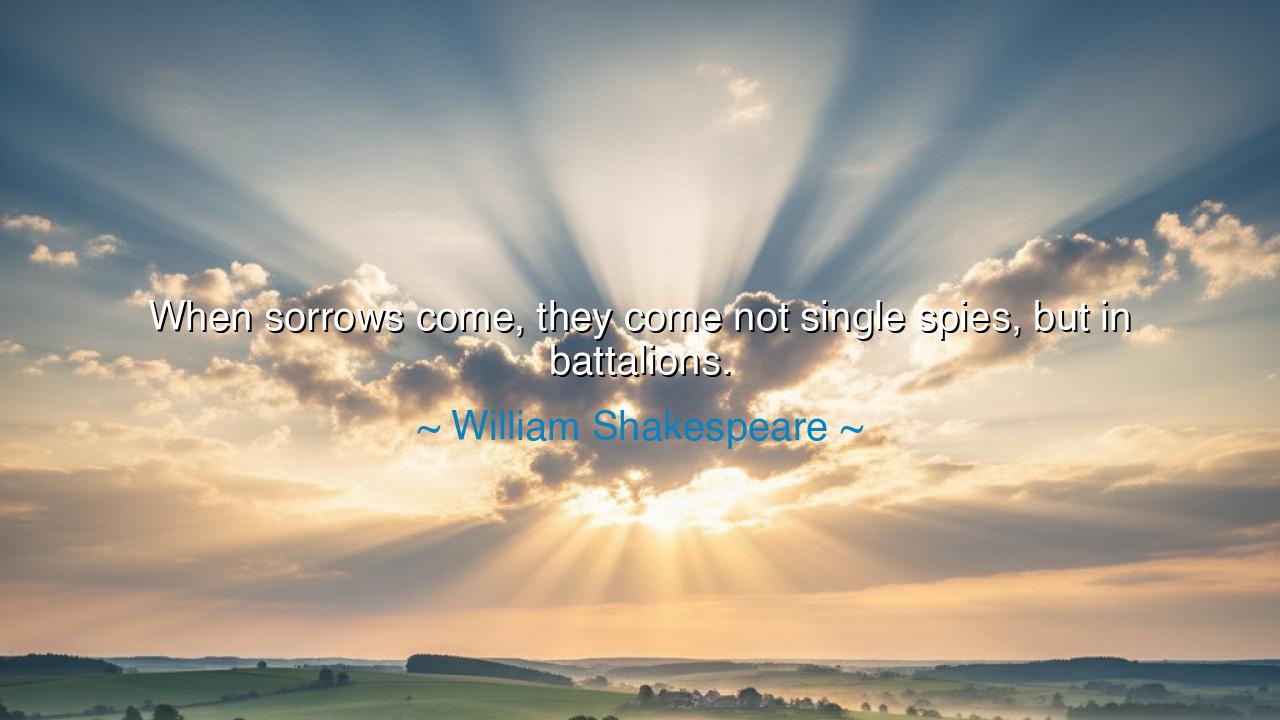
When sorrows come, they come not single spies, but in






William Shakespeare, poet of eternity and voice of the human heart, wrote in Hamlet: “When sorrows come, they come not single spies, but in battalions.” In this line, spoken by the king upon hearing of the disasters befalling Denmark, lies a truth known to all who have walked through the valley of grief: that misfortune rarely comes alone. Instead, like soldiers descending upon a weakened citadel, one sorrow summons another, and another, until the heart is besieged by an army of troubles.
The ancients knew this well. In the tragedies of Greece, the hero rarely suffers one blow of fate, but many in swift succession. Oedipus loses not only his throne, but his sight, his mother, and his peace of soul. Agamemnon returns victorious from Troy, only to fall to the knife of betrayal in his own home. Such was the teaching of the dramatists: that once the gates of suffering are opened, the storm rushes in with overwhelming force, and sorrows march like battalions, not creeping like solitary spies.
History, too, confirms this grim wisdom. Consider the fall of the Romanov dynasty in Russia. First came the sorrow of war, then the hunger of the people, then the uprisings, then the imprisonment, then the execution of the royal family. Misfortune did not strike once, but in wave after wave, leaving behind ruin that reshaped the world. In this, Shakespeare’s words are not mere poetry, but prophecy of human fate — that calamity, once begun, breeds companions swiftly.
Yet Shakespeare’s insight is not only lament; it is also instruction. For if we know that sorrows come in battalions, then we must prepare our hearts for their onslaught. The unready soul is like an undefended city, collapsing at the first siege. But the prepared soul, trained by patience, discipline, and hope, may endure wave after wave without surrender. Just as a wise commander fortifies his walls before the enemy gathers, so must we strengthen our spirits before the battalions of sorrow arrive.
There is also comfort hidden in this grim observation. For if sorrows come in battalions, so too do their opposites. Often when relief comes, it brings companions: peace, renewal, friendship, and hope return together, as if marching in their own companies. History shows this as well: after the long night of World War II, nations rebuilt, families reunited, and hope surged like a flood. Darkness may arrive in armies, but so too can light.
What, then, is the lesson? It is this: do not despair when misfortune multiplies, for you are not alone in that experience. Every age, every people, every life has known the battalions of sorrow. Stand firm, and do not curse the heavens when grief comes in numbers; rather, call upon your own battalions — courage, faith, friendship, perseverance. For just as sorrows rarely march alone, neither do strengths, if we summon them.
So, O children of tomorrow, remember the wisdom of Shakespeare: “When sorrows come, they come not single spies, but in battalions.” Expect the onslaught, but do not be crushed by it. Prepare your heart as a fortress, your will as a sword, your hope as a shield. And when the battalions descend, you will endure, and when the tide of sorrow breaks at last, you will rise stronger, tempered like steel in the fire of adversity.






AAdministratorAdministrator
Welcome, honored guests. Please leave a comment, we will respond soon